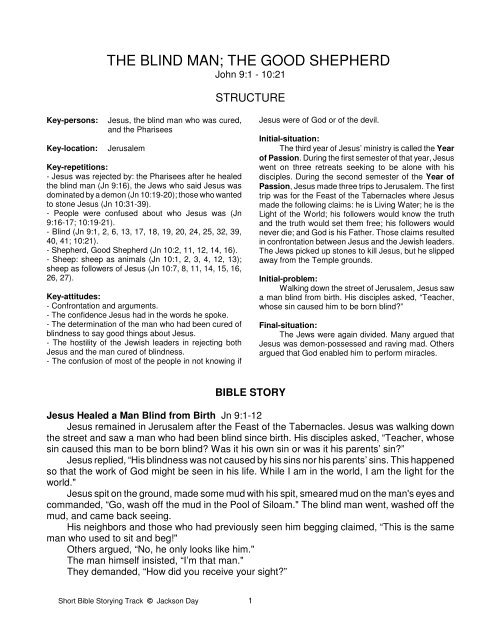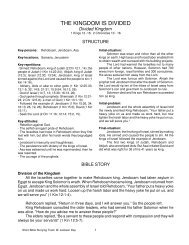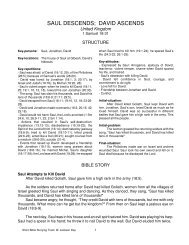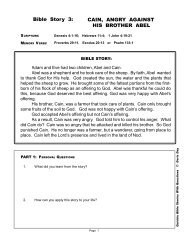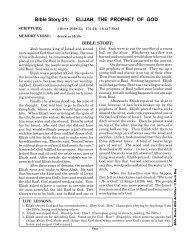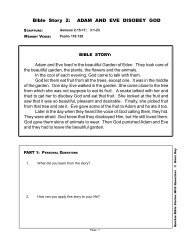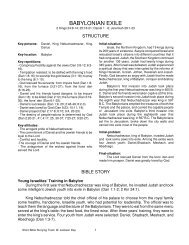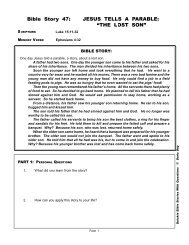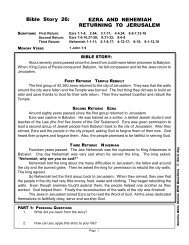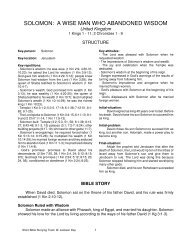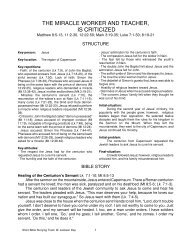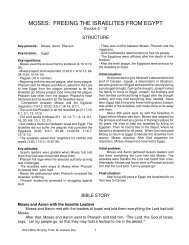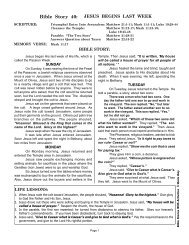The Blind Man; the Good Shepherd - Bible Storytelling
The Blind Man; the Good Shepherd - Bible Storytelling
The Blind Man; the Good Shepherd - Bible Storytelling
You also want an ePaper? Increase the reach of your titles
YUMPU automatically turns print PDFs into web optimized ePapers that Google loves.
THE BLIND MAN; THE GOOD SHEPHERDJohn 9:1 - 10:21STRUCTUREKey-persons:Key-location:Jesus, <strong>the</strong> blind man who was cured,and <strong>the</strong> PhariseesJerusalemKey-repetitions:- Jesus was rejected by: <strong>the</strong> Pharisees after he healed<strong>the</strong> blind man (Jn 9:16), <strong>the</strong> Jews who said Jesus wasdominated by a demon (Jn 10:19-20); those who wantedto stone Jesus (Jn 10:31-39).- People were confused about who Jesus was (Jn9:16-17; 10:19-21).- <strong>Blind</strong> (Jn 9:1, 2, 6, 13, 17, 18, 19, 20, 24, 25, 32, 39,40, 41; 10:21).- <strong>Shepherd</strong>, <strong>Good</strong> <strong>Shepherd</strong> (Jn 10:2, 11, 12, 14, 16).- Sheep: sheep as animals (Jn 10:1, 2, 3, 4, 12, 13);sheep as followers of Jesus (Jn 10:7, 8, 11, 14, 15, 16,26, 27).Key-attitudes:- Confrontation and arguments.- <strong>The</strong> confidence Jesus had in <strong>the</strong> words he spoke.- <strong>The</strong> determination of <strong>the</strong> man who had been cured ofblindness to say good things about Jesus.- <strong>The</strong> hostility of <strong>the</strong> Jewish leaders in rejecting bothJesus and <strong>the</strong> man cured of blindness.- <strong>The</strong> confusion of most of <strong>the</strong> people in not knowing ifJesus were of God or of <strong>the</strong> devil.Initial-situation:<strong>The</strong> third year of Jesus’ ministry is called <strong>the</strong> Yearof Passion. During <strong>the</strong> first semester of that year, Jesuswent on three retreats seeking to be alone with hisdisciples. During <strong>the</strong> second semester of <strong>the</strong> Year ofPassion, Jesus made three trips to Jerusalem. <strong>The</strong> firsttrip was for <strong>the</strong> Feast of <strong>the</strong> Tabernacles where Jesusmade <strong>the</strong> following claims: he is Living Water; he is <strong>the</strong>Light of <strong>the</strong> World; his followers would know <strong>the</strong> truthand <strong>the</strong> truth would set <strong>the</strong>m free; his followers wouldnever die; and God is his Fa<strong>the</strong>r. Those claims resultedin confrontation between Jesus and <strong>the</strong> Jewish leaders.<strong>The</strong> Jews picked up stones to kill Jesus, but he slippedaway from <strong>the</strong> Temple grounds.Initial-problem:Walking down <strong>the</strong> street of Jerusalem, Jesus sawa man blind from birth. His disciples asked, “Teacher,whose sin caused him to be born blind?”Final-situation:<strong>The</strong> Jews were again divided. <strong>Man</strong>y argued thatJesus was demon-possessed and raving mad. O<strong>the</strong>rsargued that God enabled him to perform miracles.BIBLE STORYJesus Healed a <strong>Man</strong> <strong>Blind</strong> from Birth Jn 9:1-12Jesus remained in Jerusalem after <strong>the</strong> Feast of <strong>the</strong> Tabernacles. Jesus was walking down<strong>the</strong> street and saw a man who had been blind since birth. His disciples asked, “Teacher, whosesin caused this man to be born blind? Was it his own sin or was it his parents’ sin?”Jesus replied, “His blindness was not caused by his sins nor his parents’ sins. This happenedso that <strong>the</strong> work of God might be seen in his life. While I am in <strong>the</strong> world, I am <strong>the</strong> light for <strong>the</strong>world."Jesus spit on <strong>the</strong> ground, made some mud with his spit, smeared mud on <strong>the</strong> man's eyes andcommanded, “Go, wash off <strong>the</strong> mud in <strong>the</strong> Pool of Siloam." <strong>The</strong> blind man went, washed off <strong>the</strong>mud, and came back seeing.His neighbors and those who had previously seen him begging claimed, “This is <strong>the</strong> sameman who used to sit and beg!"O<strong>the</strong>rs argued, “No, he only looks like him."<strong>The</strong> man himself insisted, “I’m that man."<strong>The</strong>y demanded, “How did you receive your sight?”Short <strong>Bible</strong> Storying Track © Jackson Day1
He replied, “Someone named Jesus made some mud with his spit, and smeared it on myeyes. He told me to go to <strong>the</strong> Poof of Siloam and wash it off. I went; I washed <strong>the</strong> mud off; <strong>the</strong>nI could see" (Jn 9:1-12).Healing Investigated by <strong>the</strong> Pharisees Jn 9:13-41<strong>The</strong> people took <strong>the</strong> man who had been blind to <strong>the</strong> Pharisees. Jesus had made <strong>the</strong> mud andhealed <strong>the</strong> man's blindness on a Sabbath day. <strong>The</strong> Pharisees grilled <strong>the</strong> man on how he hadreceived his sight.He replied, “Jesus put mud on my eyes, and I washed it off; now I see."Some of <strong>the</strong> Pharisees said, “This man Jesus is not from God, for he does not keep <strong>the</strong>Sabbath."O<strong>the</strong>rs countered, “How can a sinner work such a miracle? So <strong>the</strong>y were divided.Finally, <strong>the</strong>y turned back to <strong>the</strong> blind man, “What do you say about him? It was your eyes heopened."<strong>The</strong> man replied, “He is a prophet."<strong>The</strong> Jewish leaders still did not believe had been born blind and had received his sight. <strong>The</strong>ysent for <strong>the</strong> man's parents, who confirmed that <strong>the</strong> man was <strong>the</strong>ir son and that he had been bornblind.<strong>The</strong> Pharisees summoned a second time <strong>the</strong> man who had been blind. <strong>The</strong>y told him, “Giveglory to God. We know this man is a sinner."He replied, “I don’t know if he is a sinner or not. One thing I do know. I was blind but now Isee!"<strong>The</strong>n <strong>the</strong>y asked him, “What did he do to you? How did he open your eyes?"He answered, “I already told you over and over and you didn’t listen. Why do you want tohear it again? Are you eager to become his disciples, too?"<strong>The</strong> leaders insulted <strong>the</strong> man, “You are this fellow's disciple! We are disciples of Moses! Weknow that God spoke to Moses, but we don't even know where this man comes from."<strong>The</strong> man answered, “Wow! You don't know where he comes from, yet he opened my eyes.We know that God listens only to people who love and obey him. No one has ever heard ofopening <strong>the</strong> eyes of a man born blind. Jesus couldn’t do anything if he didn’t come from God.”<strong>The</strong> leaders replied, “You were born and brought up in sin; how dare you lecture us!" And<strong>the</strong>y expelled him from <strong>the</strong> synagogue (Jn 9:13-34).Jesus heard what happened. He found <strong>the</strong> man and asked, “Do you believe in <strong>the</strong> Son of<strong>Man</strong>?"<strong>The</strong> man answered "Who is he, sir? Tell me who he is so that I may believe in him."Jesus said, “You have already seen him; in fact, he is <strong>the</strong> one speaking with you."<strong>The</strong>n <strong>the</strong> man said, “Lord, I believe in you," and he worshiped Jesus.Jesus said, “I came into this world, so that <strong>the</strong> blind will see and those who make a pretenseof seeing will be exposed as blind."Some Pharisees overheard him and asked, “What? Are you calling us blind?”Jesus said, “If you were blind, you would not be guilty of sin; but since you claim you can see,you are accountable for every sin” (Jn 9:35-41).<strong>The</strong> <strong>Good</strong> <strong>Shepherd</strong> and His Flock Jn 10:1-21Jesus continued, “I tell you <strong>the</strong> truth, only thieves and robbers climb over <strong>the</strong> fence of asheep pen instead of entering through <strong>the</strong> gate. <strong>The</strong> shepherd of <strong>the</strong> sheep enters through <strong>the</strong>gate. <strong>The</strong> sheep listen to his voice. He calls his own sheep by name and leads <strong>the</strong>m out. WhenShort <strong>Bible</strong> Storying Track © Jackson Day2
he gets his sheep out, he goes on ahead of <strong>the</strong>m. His sheep follow him because <strong>the</strong>y know hisvoice. <strong>The</strong>y will never follow a stranger; in fact, <strong>the</strong>y will run away from <strong>the</strong> stranger because <strong>the</strong>ydon’t recognize a stranger's voice.“I am <strong>the</strong> gate for <strong>the</strong> sheep. All those o<strong>the</strong>rs are thieves and robbers, but <strong>the</strong> sheep don’tlisten to <strong>the</strong>m. I am <strong>the</strong> gate; anyone who enters through me will be saved. He will come in andgo out, and find pasture. A thief comes only to steal, kill, and destroy; I came that <strong>the</strong>y may havelife, and have it in all its fullness."I am <strong>the</strong> good shepherd. <strong>The</strong> good shepherd gives up his life for his sheep. <strong>The</strong> hired workeris not like <strong>the</strong> shepherd. <strong>The</strong> hired worker doesn’t own <strong>the</strong> sheep. When <strong>the</strong> hired worker sees<strong>the</strong> wolf coming, he runs off and abandons <strong>the</strong> sheep. <strong>The</strong>n <strong>the</strong> wolf attacks and scatters <strong>the</strong>flock. A hired worker runs away because <strong>the</strong> sheep mean nothing to him."I am <strong>the</strong> good shepherd; I know my sheep; my sheep know me. In <strong>the</strong> same way, <strong>the</strong> Fa<strong>the</strong>rknows me and I know <strong>the</strong> Fa<strong>the</strong>r. I give up my life for <strong>the</strong> sheep. I have o<strong>the</strong>r sheep in additionto those in this sheep pen. I must bring <strong>the</strong>m toge<strong>the</strong>r also. <strong>The</strong>y too will listen to my voice. <strong>The</strong>n<strong>the</strong>re will be one flock of sheep and one shepherd.“<strong>The</strong> reason my Fa<strong>the</strong>r loves me is that I give up my life, and I am free to take it up again.No one takes my life from me, but I give it up of my own free will. I have authority to give it up andauthority to take it up again. This authority I received from my Fa<strong>the</strong>r" (Jn 10:1-18).After hearing Jesus’ words, <strong>the</strong> Jews were again divided. <strong>Man</strong>y said, “He is demonpossessedand raving mad. Why listen to him?"O<strong>the</strong>rs argued, “<strong>The</strong>se are not <strong>the</strong> words of a demon-possessed man. Can a demon givesight to <strong>the</strong> blind?" (Jn 10:19-21).GENERIC DIALOGUE QUESTIONS1. What catches your attention in <strong>the</strong> story?2. Is <strong>the</strong>re anything in <strong>the</strong> story that is hard to understand?3. Who are <strong>the</strong> main characters in <strong>the</strong> story?4. What problems did <strong>the</strong> characters face?5. How did <strong>the</strong> characters face <strong>the</strong>ir problems?6. How have you faced similar problems?7. Is <strong>the</strong>re someone in <strong>the</strong> story who is similar to you or who is different from you?8. What does <strong>the</strong> story tell about God?SPECIFIC DISCUSSION QUESTIONS1. How did Jesus heal <strong>the</strong> man born blind?2. Why did <strong>the</strong> healing of <strong>the</strong> blind man result in open opposition between different people?3. How did Jesus compare himself to a shepherd?4. How is <strong>the</strong> relationship between sheep and <strong>the</strong>ir shepherd comparable to that between Jesus and his followers?5. How can you discern if a religious leader is similar to those Jesus called hired workers, who don’t care about <strong>the</strong>sheep, or if he is a shepherd who is willing to sacrifice for his flock?LIFE-LESSONS1. Some diseases are <strong>the</strong> results of sin; however, notall sickness is <strong>the</strong> result of sin. Sometimes goodbehavior is unrewarded and bad behavior isunpunished. Sometimes innocent people suffer.Jesus said sin did not cause <strong>the</strong> man to be bornblind (Jn 9:3).2. <strong>The</strong> person who follows Jesus may sufferpersecution. <strong>The</strong> man who was healed ofblindness testified for Jesus; he was cursed andevicted from <strong>the</strong> synagogue (Jn 9:28, 34).Short <strong>Bible</strong> Storying Track © Jackson Day3
3. <strong>The</strong>re was a contrast between <strong>the</strong> religiousleaders, who were false prophets, and Jesus. <strong>The</strong>false prophets expelled <strong>the</strong> believer in Jesus from<strong>the</strong>ir presence (Jn 9:34). However, Jesusaccepted him, made him a part of his flock (Jn10:16), and made him one of his sheep (Jn 10:3-4,14).4. As a shepherd, Jesus' work has many aspects:1 st He is <strong>the</strong> "<strong>Good</strong> <strong>Shepherd</strong>" who gives his lifefor <strong>the</strong> sheep (Jn 10:11).2 nd He is "<strong>The</strong> Gate” through which, if anyoneenters, he will be protected (Jn 10:9).3 rd He is <strong>the</strong> <strong>Shepherd</strong> who knows each sheep;he knows each one by name (Jn 10:3,14-15).4 th He is <strong>the</strong> <strong>Shepherd</strong> who leads, going aheadto show <strong>the</strong> road that <strong>the</strong> sheep shouldfollow (Jn 10:4).5 th He is <strong>the</strong> <strong>Shepherd</strong> who secures andprotects his sheep. No one will snatch asheep out of his hand (Jn 10:27-28).6 th He is <strong>the</strong> "Great <strong>Shepherd</strong> of <strong>the</strong> Flock." Hebecame <strong>the</strong> Great <strong>Shepherd</strong> because of hisdeath. <strong>The</strong> Great <strong>Shepherd</strong>'s goal is to equipeach person for doing God’s will (Heb13:20-21).7 th He is <strong>the</strong> “Head <strong>Shepherd</strong>”, who will return todistribute crowns of rewards to faithfulshepherds who serve him (1 Pet 5:4).5. <strong>The</strong>re are three types of spiritual leaders:#<strong>The</strong> shepherd (Jn 10:10-11). He loves <strong>the</strong> sheepand is willing to give his life to protect <strong>the</strong>m.#<strong>The</strong> hired hand (<strong>the</strong> mercenary) (Jn 10:12). <strong>The</strong>mercenary only works for money. He does goodthings for <strong>the</strong> sheep, taking <strong>the</strong>m to water andfood. He won't abuse <strong>the</strong>m; however, he doesn'ttake risks to protect <strong>the</strong>m. When a wolf comes, hewon't risk his life by standing between <strong>the</strong> sheepand <strong>the</strong> wolf. Although <strong>the</strong> mercenary doesn'tabuse <strong>the</strong> sheep, he allows <strong>the</strong> wolf or thief toattack <strong>the</strong>m.#<strong>The</strong> wolf or thief (Jn 10:8, 12). <strong>The</strong> wolf or thief isa false prophet who will attack and abuse <strong>the</strong>sheep for his own advantage.6. Jesus accepted <strong>the</strong> cross and resurrection asGod’s plan. No one could have killed Jesus withouthis consent. He declared he would lay down hislife, only to take it up again (Jn 10:17-18).Short <strong>Bible</strong> Storying Track © Jackson Day4


